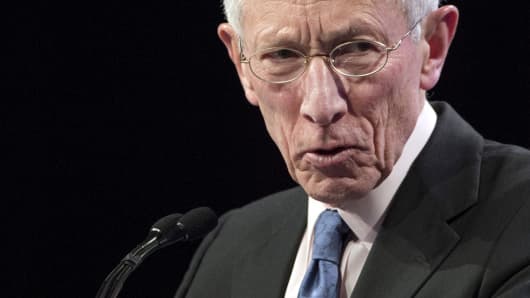The stock market rallied on Monday following Fed Vice Chair Stanley Fischer's comments in a Bloomberg TV interview that, while employment is close to the Fed's target, inflation remains too low.
Read MoreWhat are stocks doing now? Click here for the latest market action
"The interesting situation in which we are is that employment has been rising pretty fast relative to previous performance and yet inflation is very low. And the concern about the situation is not to move before we see inflation as well as employment returning to more normal levels," he said. "If the Fed were focused solely on inflation, it would have to try to be more accommodative, if that was possible," Fischer said during the interview.
The stock market appeared to take Fischer's words to mean that a September rate hike was not a given, despite comments to the contrary by a few other Fed officials.
It is also quite surprising to hear Mr. Fischer suggest that inflation may be more important than employment in setting Fed policy. He was the first major Fed official to suggest that a rate hike this year was a virtual certainty.
Read MoreHow to anger Asia, Fed in one shot: Devalue the yuan
What is even more interesting to me is that the Fed, especially Mr. Fischer, continues to insist that low inflation is a transitory, or temporary, phenomenon, largely driven by the resumed drop in oil prices.
Oil prices, of course, have revisited their most recent lows in the last few days,dropping below $43 a barrel on Tuesday, while gasoline prices have dropped 11 cents a gallon in the past two weeks.
The problem with viewing low inflation as a transitory phenomenon is that it has been "temporarily low" for the last six years — and counting.
And, of course, it's not just energy costs that are dropping. Economically-sensitive commodities, from copper to steel and from soybeans to sugar, are down anywhere from 30 percent to 50 percent over the past 12 months and have yet to bottom out in a convincing manner.
Read MoreWhy these falling prices may be bad for you
In short, commodities have crashed. And while are some are saying a buying opportunity in raw materials is close at hand, a delayed rate hike from the Fed would be an explicit admission that both the domestic, and global, economies are still vulnerable to deflation … yes, deflation, despite some nascent signs to the contrary, has reared its ugly head again.
Much of the persistent weakness in commodity prices is due, in part, to a noticeable slowdown in China's economy.
Over the weekend, it was reported that China's exports, and imports, both fell over 8 percent in the most recently reported month. China's stock market, Monday's rebound notwithstanding, is creating a negative wealth effect on the Chinese economy as recent reports show that car buyers in China are slowing their purchases of new cars, despite generous incentives.
Over half a trillion dollars in capital outflows have escaped China in the past 12 months, pushing China's central bank to sell $180 billion worth of U.S. Treasury bonds. Were it not for a deflationary backdrop, Chinese sales of U.S. bonds should have caused a bond market rout. Instead, the bond market barely budged as the sales took place.
The rest of the world doesn't look so hot, either. Russia and Brazil are in real recessions, not just growth slowdowns. That means three of the four so-called "BRIC" nations are weak, with India a bit of a question mark.
The stronger dollar, tighter credit conditions worldwide, and the threat of a Fed rate hike, have pressured global markets of late. Emerging markets have been hit hard and commodity prices have been driven ever lower, just on talk. Who knows what an actual rate hike might do?
Adding to the deflationary pressures is China's surprising -- and dramatic -- devaluation of its currency, the yuan.
Not only is this an admission that China's economy is desperately in need of stimulus, but also a move that will only serve to exacerbate downward pressure on prices worldwide.
Read MoreCurrency war? How China devaluation may impact Fed
I think that the odds are now 50-50 or better that the Fed will wait a few more months before raising rates.
The "Greenspan put" may be gone, but say hello to the market's new "Fisch net."
Commentary by Ron Insana, a CNBC and MSNBC contributor and the author of four books on Wall Street. He is also editor of "Insana's Market Intellgence," available at Marketfy.com. Follow him on Twitter @rinsana.



